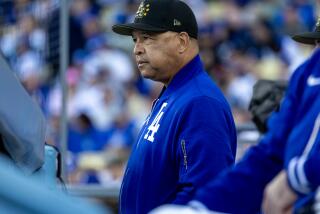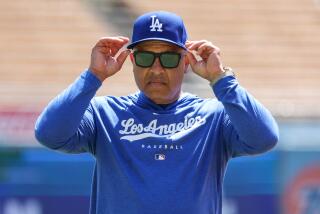Baseball Free Agent Ruling Due Monday; Marvin Miller Muses
- Share via
The players, the owners and the just plain fans will find out on Monday what arbitrator Tom Roberts has decided in the baseball free agency grievance.
But the man who led the players to super salaries -- former union head Marvin Miller -- says no matter what Roberts decides the matter will be far from resolved.
The issue is simple: Was there a conspiracy among the 26 major league clubs not to sign each other’s free agents after the 1985 season?
Miller says the decision should be just as simple.
“It’s in violation of the agreement,” said Miller, former executive director of the Major League Players Association.
“Simple justice dictates he finds the owners conspired. For nine years there was a free market, then it stopped.”
The players’ union has maintained that the owners are in violation of a portion of the Basic Agreement. That portion -- article 18, section H -- reads:
“Players shall not act in concert with other players and clubs shall not act in concert with other clubs.”
If Roberts finds the owners guilty of collusion, he could also determine a remedy, which may be financial, or a structural change in free agency, or both. But Miller says Roberts’ finding will have very little impact down the road.
“The decision will not get to the long-range solution,” Miller said. “It will not deal with the future.
“What if he says you (the owners) have to compensate the free agents? That’s like having a law that says if you rob a bank and get caught, you have to give the money back.”
Miller, who spent 17 years as executive director of the players union, was seen as a hard line union man and was credited for the free-agent system which has allowed many players to earn instant millions.
When Miller took over as union head, the average players’ salary was $10,000. When he left for the first time in 1981 it had escalated to more than $200,000.
He guided the union through the 50-day strike in 1981, and retired with Ken Moffett’s election.
Moffett, however, was dismissed in 1983 and Miller came back before giving way to current executive director Don Fehr.
Free agency, which was instituted in 1976, was among the landmark changes engineered by Miller. It was Miller who fought for a change in the controversial reserve clause, a system which had bound a player to a team for his entire career or until he was traded or sold.
In 1969 Curt Flood, Tim McCarver, Byron Brown and Joe Horner were traded by St. Louis to Philadelphia for Dick Allen, Cookie Rojas and Jerry Johnson. Flood refused to report, was suspended, and sued to become a free agent.
The case eventually went to the Supreme Court which ruled in June, 1972, to uphold baseball’s anti-trust exemption.
Miller says he doubts it would help the union to take their case to court today, either.
“I’m a real doubter of getting justice through the courts,” Miller said.
In 1975, the players found their justice through an arbitrator when pitchers Dave McNally and Andy Messersmith became the first free agents to play out their options and earn the right to sell their services to the highest bidder.
Arbitrator Peter Seitz, who also declared Jim “Catfish” Hunter a free agent in December 1974, because of breach of contract by Oakland owner Charles Finley, ruled on the Messersmith case on Dec. 23, 1975.
He said the reserve clause was illegal, thus eliminating teams’ “lifetime ownership” of their players.
That decision led to big contracts and sometimes big mistakes by the owners.
“I knew it (free agency) was going to be a problem,” Messersmith said. “I think the owners made a few faux pas early on. They didn’t control themselves very well with the players’ salaries. Now, they may be seeing the error of their ways.”
Messersmith signed a multiyear deal with Atlanta prior to the 1976 season for an estimated $1.75 million of Ted Turner’s money. He was 11-11 that season and 5-4 in 1977. After the ’77 season he was sold to the Yankees.
Miller sees the decline in free-agent offers linked to the hiring of Peter Ueberroth as commissioner in 1984.
“That’s what he was hired for -- he was hired to make money,” Miller said.
During the contract negotiations in 1985, which resulted in a two-day strike, the owners opened their books and claimed they were losing money.
“Maybe a few teams -- Oakland, San Francisco, Cleveland, San Diego -- were losing money, but you would have to be an economic idiot to say most franchises are losing money.
“Every time a franchise changes hands the the price goes up and up and up,” Miller said.
Miller has a possible solution, although, as the USFL found, very risky.
“How do you enforce a free and open market with a conspirator? With a competitive league,” Miller said.
Miller says he’s not surprised the free-agent market has seemingly dried up -- for whatever the reasons.
“We’re dealing with a heritage of 100 years of conspiracy,” he said.
The current agreement runs through 1989 and if grievances do not bring a solution to the union’s claim of collusion, they will no doubt seek one then.
A separate grievance dealing with last winter’s free agents is also pending with a decision on that case expected in November or December.
“We’re both looking forward to getting this decision and putting it behind us,” said Barry Rona, executive director of management’s Player Relations Committee.
“I’d like to see a decision and put the issue to bed. I have said before and I’ll continue to say I don’t personally view this as a major landmark decision, but one that is fairly narrow in terms of scope and the impact it will have.”
The grievance that Roberts is considering was filed by the players association on Feb. 2, 1986 after outfielder Kirk Gibson, the outstanding free agent that winter, re-signed with the Detroit Tigers and reported that he had no offers from any other teams. That winter, only two of 62 re-entry free agents -- journeymen Juan Beniquez and Dane Iorg -- changed teams.
Last winter, when front line free agents like batting champion Tim Raines and pitcher Jack Morris received no offers from clubs other then their own, the players association filed another grievance. That action is currently being heard by arbitrator George Nicolau.
Roberts began hearing the first collusion case last summer but was dismissed by the owners Aug. 5, 1986. That dismissal, in the middle of a hearing, was grieved by the union and subsequently reversed by arbitrator Richard Bloch, whose decision returned Roberts to the case.
More to Read
Go beyond the scoreboard
Get the latest on L.A.'s teams in the daily Sports Report newsletter.
You may occasionally receive promotional content from the Los Angeles Times.










